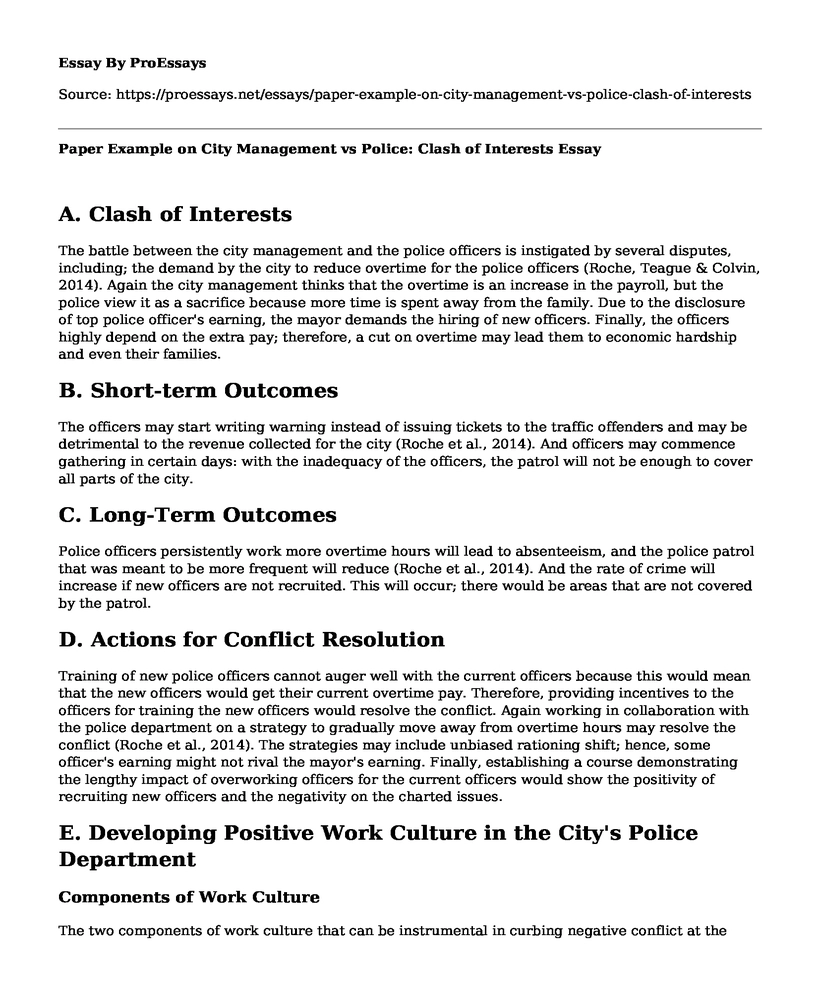A. Clash of Interests
The battle between the city management and the police officers is instigated by several disputes, including; the demand by the city to reduce overtime for the police officers (Roche, Teague & Colvin, 2014). Again the city management thinks that the overtime is an increase in the payroll, but the police view it as a sacrifice because more time is spent away from the family. Due to the disclosure of top police officer's earning, the mayor demands the hiring of new officers. Finally, the officers highly depend on the extra pay; therefore, a cut on overtime may lead them to economic hardship and even their families.
B. Short-term Outcomes
The officers may start writing warning instead of issuing tickets to the traffic offenders and may be detrimental to the revenue collected for the city (Roche et al., 2014). And officers may commence gathering in certain days: with the inadequacy of the officers, the patrol will not be enough to cover all parts of the city.
C. Long-Term Outcomes
Police officers persistently work more overtime hours will lead to absenteeism, and the police patrol that was meant to be more frequent will reduce (Roche et al., 2014). And the rate of crime will increase if new officers are not recruited. This will occur; there would be areas that are not covered by the patrol.
D. Actions for Conflict Resolution
Training of new police officers cannot auger well with the current officers because this would mean that the new officers would get their current overtime pay. Therefore, providing incentives to the officers for training the new officers would resolve the conflict. Again working in collaboration with the police department on a strategy to gradually move away from overtime hours may resolve the conflict (Roche et al., 2014). The strategies may include unbiased rationing shift; hence, some officer's earning might not rival the mayor's earning. Finally, establishing a course demonstrating the lengthy impact of overworking officers for the current officers would show the positivity of recruiting new officers and the negativity on the charted issues.
E. Developing Positive Work Culture in the City's Police Department
Components of Work Culture
The two components of work culture that can be instrumental in curbing negative conflict at the workplace include; firstly, reduce unwanted stress, confusion, and tension among employees. The city management should ensure that the police officers' are free from stress, such as financial hardship (Roche et al., 2014). Secondly, employees should be instilled with the culture of ensuring that they focus on the potential consequences of behaviors while addressing the conflict.
Job Specifications
Concerning the "Job Description of City Police Officers," it is essential that the following specifications are embedded in the "required" section; the applicant should possess strong conflict management skills and the ability to diffuse tension and the willingness to adopt effective conflict resolution (Roche et al., 2014).
Situational Interview Questions
The following are the situational interview questions; firstly, how would you react to the news that your employer plans to subject all workers to pay cut in a bid to cut the operational cost? Secondly, what are some of the conflict resolution methods you will pursue in the circumstances where you feel your employer has reneged on a promise to increase your salary? Lastly, how would you prevail upon your colleagues to ensure that every option available is exhausted while seeking conflict resolution?
F. Evaluating Improvements in Employee Relations
The first method for evaluating employee relations is choosing the quantity of the grievances, which is reported at a specific time using the metrics (Roche et al., 2014). It is a good strategy because it assists the HR to analyze the quantity of grievances demonstrated by the employee populace to decide rations. And to determine the reasons for objections utilizing reporting which aid the HR in recognizing strategies in particular issues or the organization and properly address them.
Reference
Roche, W. K., Teague, P., & Colvin, A. J. (Eds.). (2014). The Oxford handbook of conflict management in organizations. Oxford University Press. https://books.google.co.ke/books?hl=en&lr=&id=tPzZAwAAQBAJ&oi
Cite this page
Paper Example on City Management vs Police: Clash of Interests. (2023, Jan 29). Retrieved from https://proessays.net/essays/paper-example-on-city-management-vs-police-clash-of-interests
If you are the original author of this essay and no longer wish to have it published on the ProEssays website, please click below to request its removal:
- Essay Example on DIY Home Improvement Market: Eco-Friendly Projects for Homeowners
- Essay on Pollution Threatens Egypt's Water Supply: Challenges & Consequences
- Essay Sample on Improving Police-Community Relations in Canada: GPC Ltd's Solution
- Essay Example on Police-Citizen Conflict: Causes and Solutions
- Essay Example on Ropeways in Tourism: An Overview
- Paper Example on 4 Types of Evidence in Ramsey Case: Physical, Doc., Expert, DNA
- Moral Issues of War Police and Terrorism in America - Free Paper Example







